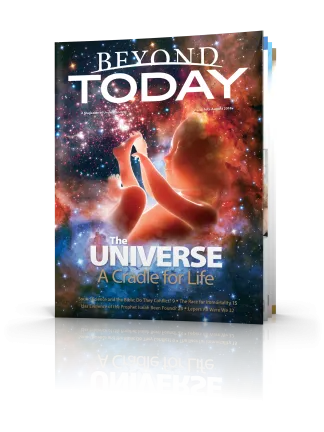God, Science and the Bible

Examining the evidence led many giants and pioneers of science to affirm their belief in the God of the Bible.
For years we’ve been publishing a section titled “God, Science and the Bible” in Beyond Today magazine and its predecessor, The Good News. We’ve done so to help our readers see that there’s no conflict between real science and the Bible, and that they in fact support and complement each other.
The Bible gives us knowledge about certain things science has not been able to discover through observation or experimentation (such as the origin of life and the universe). And scientific discoveries—at least for those with eyes to see and ears to hear—continually teach us about the astounding thinking, planning and perfection our Creator put into His handiwork that we see all around us. We explore both of these themes in the articles in this issue.
I’ve had a strong interest in science for as long as I can remember. Back in school I placed first in the science fair three times—with detailed cutaway models of the various types of cells in the human body, a scale model of an American Indian mound builder village as it would’ve appeared around the year 1500, and an excavation report and model of an American Indian cave shelter that I and my family had helped excavate as a project of the local archaeological society (of which we were members).
Interestingly, both of those fields of science—biology and archaeology—led me to a firm belief in God and that the Bible is His inspired revelation to mankind. Both of these great truths became clearly evident when I examined the evidence.
Examining the evidence led many giants and pioneers of science to affirm their belief in the God of the Bible. In fact, it was belief in an ordered universe by the hand of a Creator that propelled them to rational scientific investigation. Notice what some of them had to say:
The Polish astronomer Nicolaus Copernicus (1473-1543), whose idea that the earth revolves around the sun profoundly impacted science, wrote: “For who, after applying himself to things which he sees established in the best order and directed by divine ruling, would not through contemplation of them and through a certain habituation be awakened to that which is best and would not admire the Artificer of all things, in whom is all happiness and every good?”
Galileo Galilei (1564-1642) was an Italian astronomer, mathematician and physicist whose astronomical observations revolutionized man’s view of the universe. He noted: “When I reflect on so many profoundly marvelous things that persons have grasped, sought, and done I recognize even more clearly that human intelligence is a work of God, and one of the most excellent.”
Johann Kepler (1571-1630), German astronomer and mathematician who formulated the laws of planetary motion, was a key figure in the 17th-century science revolution. An early user of the telescope, he saw order and planning in the movements of heavenly bodies that reflected their Creator. He observed: “Geometry . . . [is] coeternal with God . . . and reflecting in the Divine mind has supplied God with the examples . . . for the furnishing of the world so that it became the best and most beautiful, and [even] also the most similar to the Creator.”
William Harvey (1578-1657) was an English physician, anatomist and physiologist who discovered how the circulatory system functions. A pioneer of the scientific method, his work affected scientific research for centuries. His studies of human and animal anatomy led him to conclude: “We acknowledge God, the Supreme and Omnipotent Creator, to be present in the production of all animals . . . All things are indeed contrived and ordered with singular providence, divine wisdom, and most admirable and incomprehensible skill.”
Scientific pioneer Sir Isaac Newton (1642-1726) was an English mathematician, physicist and astronomer best known for formulating laws of motion and gravitation. Not coincidentally, he was also a theologian of note. Reflecting on the intersection of science and theology, he commented: “As a blind man has no idea of colours, so have we no idea of the manner by which the all-wise God perceives and understands all things . . . We know Him only by His most wise and excellent contrivances of things and final causes; we admire Him for His perfections, but we reverence and adore Him on account of His dominion, for we adore Him as His servants.”
A great deal of our understanding of our planet, solar system and universe rests on the foundational work of scientific giants like these. They saw no conflict between God, science and the Bible, and neither should we. We encourage you to read all the articles that follow to gain a deeper understanding of these issues!






